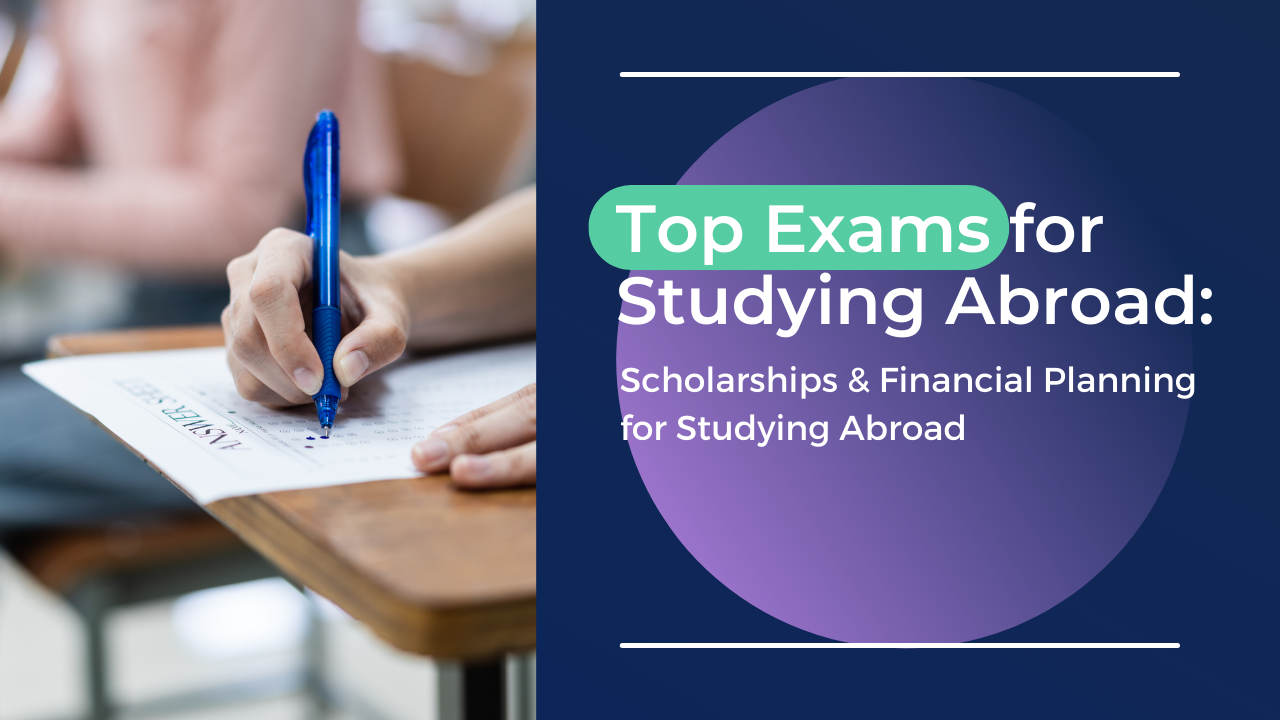
Introduction
Dreaming of a global education? Embarking on the journey to study abroad is a transformative experience that opens the door to diverse cultures, top-tier education, and unparalleled career opportunities. It’s a chance to broaden your horizons, gain a global perspective, and immerse yourself in a new academic and social environment. However, before you pack your bags and step into this exciting new chapter, there’s a crucial milestone to conquer: taking the exams to study abroad. These exams are not only an investment in your university entry, but they are also proof of your readiness for the international high academic challenge. They are categorized to measure your language and thinking skills along with the course content knowledge, these tests serve a significant purpose of demonstrating to the world that you are ready to perform in a high-stakes global environment. Depending on whether you hope to get an undergraduate degree, want to derive an advanced postgraduate degree, or would like to do something more than that in the form of conducting research, there are numerous study abroad exams designed, each according to a specific purpose and target. They include the following tests: From English proficiency tests such as TOEFL and IELTS to quantitatively based tests like GRE and GMAT, your results on these exams could be the beginning of a great international learning experience. In this comprehensive guide, we’ll delve into the most popular exams to study abroad, their significance, and how you can strategically prepare to achieve your dream scores. Which test best aligns with your aspirations, or which exams are essential for your desired destination? Keep reading as we unravel everything you need to know about entrance exams to study abroad and how to ace them with confidence. Your global education journey begins here!Why Are Exams to Study Abroad Important?
Exams are a crucial benchmark, measuring your academic performance, language skills, and your preparedness to cope with the academic load of the international level. Universities throughout the world use these standardized tests to assess candidates to ensure they meet the academic and linguistic standards required and are capable of performing well in multicultural surroundings. Passing these exams to study abroad is quite often the toll to getting into some of the finest universities in the world.Why Are Study Abroad Exams So Important?
Clearing these exams demonstrates not only your academic competence but also your adaptability and willingness to meet global educational standards. From validating your skills to making you stand out among thousands of applicants, these tests play an integral role in shaping your journey.Benefits of Excelling in Study Abroad Exams
Excelling in Exams to Study Abroad unlocks opportunities at top universities, scholarships, and global exposure, paving the way for academic and career success!
- Enhanced Opportunities: It brightens one’s chances of getting to the university of their choice or receiving a scholarship.
- Skill Validation: Language proficiency tests such as IELTS and TOEFL let you know if you are ready to grapple with classes, assignments, or even interact in a foreign language.
- Global Recognition: Standard end-of-course tests such as the GRE, GMAT, and SAT are known and valued worldwide, which significantly increases the credibility of your application.
- Boosts Confidence: When you prepare for these exams and clear them, you feel determined to tackle more of the challenges of studying in other countries.

Top Three Exams to Study Abroad
From language proficiency tests to specialized entrance exams, here’s a comprehensive list of the most important exams to study abroad:Language Proficiency Exams
Proving language skills is crucial for non-native English speakers studying abroad. These tests evaluate your ability to read, write, speak, and comprehend English effectively.IELTS (International English Language Testing System)
- Widely Accepted: Recognized by universities in the UK, Canada, Australia, and more.
- Test Format: Covers Listening, Reading, Writing, and Speaking.
- Preparation Tip: Practice mock tests and focus on time management.
TOEFL (Test of English as a Foreign Language)
- Ideal for: US-based universities.
- Test Format: Includes Reading, Listening, Speaking, and Writing sections.
- Fun Fact: TOEFL is internet-based, making it accessible worldwide.
PTE (Pearson Test of English)
- Focus Area: Advanced AI-powered assessment.
- Why Choose It?: Quick results and acceptance in Australia and New Zealand.

Standardized Entrance Exams to Study Abroad
Exams to Study Abroad assess your academic readiness for programs and play a vital role in admissions. Prepare well to secure a spot at your dream university!GRE (Graduate Record Examination)
- For Whom?: Aspiring postgraduate students in fields like Engineering, Sciences, and Humanities.
- Test Format: Verbal Reasoning, Quantitative Reasoning, and Analytical Writing.
- Pro Tip: Focus on building a solid vocabulary for GRE success.
GMAT (Graduate Management Admission Test)
- Perfect For: MBA and management aspirants.
- Test Format: Analytical Writing, Integrated Reasoning, Quantitative, and Verbal sections.
- Why GMAT?: Recognized by top business schools worldwide.
SAT (Scholastic Assessment Test)
- Who Needs It?: Undergraduate applicants, especially in the US.
- Structure: Includes Math, Evidence-Based Reading, and Writing.
- Study Tip: Practice with sample papers to improve accuracy.
Specialized Exams To Study Abroad
Certain fields require additional tests to gauge specific skills.MCAT (Medical College Admission Test)
- Designed For: Medical school aspirants in the US and Canada.
- Focus: Biological sciences, physical sciences, and verbal reasoning.
LSAT( Law School Admission Test)
- Best For: Law school hopefuls.
- Test Format: Logical reasoning, reading comprehension, and analytical thinking.
How to Prepare for Study Abroad Exams?
Acing study abroad exams requires strategic planning, consistent effort, and the right resources.Preparation Tips:
- Understand the Exam Format: Familiarize yourself with the structure, syllabus, and marking scheme.
- Practice Regularly: Take mock tests to identify weak areas.
- Enroll in Coaching Classes: Professional guidance can make a significant difference.
- Time Management: Allocate specific hours daily for focused preparation.
- Stay Updated: Check for updates on exam patterns and requirements.

Conclusion
Navigating the exams to study abroad can seem daunting, but with the proper preparation, it’s completely achievable. By choosing the appropriate exam, dedicating time to practice, and utilizing available resources, you can enhance your chances of securing admission to your dream university. Whether it’s the TOEFL, IELTS, GRE, or GMAT, each test plays a critical role in opening doors to international education and global career opportunities. Get started on your preparation today and take the first step toward your global academic adventure!FAQs
Q1: What is the easiest examination to study overseas?
A1: However, many students find the PTE (Pearson Test of English) simpler compared to others, like IELTS or TOEFL, because of its straightforward format and computer-based testing. The PTE exam includes speaking, writing, reading, and listening sections but with a more streamlined approach. That being said, the goal of most students will determine the type of exam to be undertaken vis a vis the country to be studied in and the program to be conducted. If you are applying to countries such as the US or the UK, both IELTS and TOEFL tests are admissible and may be preferable.Q2: Can I retake exams if I don’t score well?
A2: Yes, most exams to study abroad allow candidates to retake the test if they don’t score well the first time. Each exam has specific guidelines regarding retake policies. For instance, TOEFL will enable you to retake the test once every 3 days, whereas IELTS can be retaken as many times as needed, provided you pay the registration fee for each attempt. GRE and GMAT also allow retakes, but they may have specific time intervals between attempts. It’s always recommended to check the exact rules of each exam to understand how often you can retake it and any restrictions or fees associated with doing so.Q3: Are scholarships available for study abroad exams?
A3: Yes! In many cases, scholarships for study abroad exams are available. Scholarships from universities and organizations are commonly provided according to your exam results. For instance, one may get merit-based scholarships if they get high scores on the GRE, GMAT, or IELTS. Certain universities around the world, especially those in the USA and Canada, use the examination results to award scholarships to the candidates. Besides, particular organizations and governments provide scholarships for students who perform well on tests, including TOEFL or SAT. For more information about the scholarships, visit the university websites or the country of your choice of study.Q4: Do I need to prepare for each section of the exam equally?
A4: While it’s essential to prepare for all sections of the exam, the level of focus you put into each section depends on your strengths and weaknesses. For example, if you excel at speaking but struggle with writing, you should allocate more time to writing practice. TOEFL, IELTS, GRE, and GMAT have different weights for each section, and understanding this can help you allocate your preparation time more effectively. Focus on areas where you feel less confident, but make sure to maintain consistency across all sections for a balanced score. It’s always helpful to take practice tests to identify areas where you need more practice.Q5: How can I improve my score on study abroad exams?
A5: There are several ways to improve your scores on study abroad exams:- Practice Regularly: Practice is vital to mastering each section. Regularly take mock tests to familiarize yourself with the format and time constraints.
- Use Preparation Materials: Invest in reputable prep books and online courses that cater to the specific exam you’re preparing for. Many test websites offer official practice materials that mimic the actual test.
- Work on Time Management: Many exams, such as the GRE and GMAT, are timed. Practice answering questions within the time limit to improve your speed and accuracy.
- Enroll in Prep Classes: Consider enrolling in a prep class if you need structured guidance. These classes can help you develop strategies for tackling difficult sections and improve your score.
- Get Feedback: Take practice exams under exam conditions and ask for feedback from mentors or coaches. Understanding where you went wrong can help you focus your preparation more effectively.
Q6: How long do I need to prepare for these exams?
A6: The amount of time that it takes to prepare for study abroad exams depend on the exam to be undertaken and individual ability. Typically, students spend between 2 months to 6 months preparing for exams. If you are comfortable with English, then TOEFL or IELTS may take less time to prepare. Still, exams that test other sections and abilities, like the GRE or GMAT, where you are tested in verbal, quantitative and analytical sections, may take more time to prepare. One should begin preparing as early as possible to make enough time to work through all the sections and redo the weaker sections.Q7: When should one take the study abroad exams?
A7: The best time to take the entrance exams to study abroad depends on your application deadlines. It’s advisable to take the exam at least 6 months before your application deadline to allow enough time to receive your scores and apply for scholarships. When considering exams, such as the GRE or GMAT, you should sit these early in the year so that if you fail, you can attempt them again. If you are taking exams such as IELTS or TOEFL, you should also provide yourself with adequate time for the results to be prepared and forwarded to the universities you wish to attend.Q8: How do I know which exam to choose for studying abroad?
A8: Choosing the proper exam depends on the country, program, and university you’re applying to. Here’s a quick guide:- TOEFL/IELTS: Required for English-speaking countries like the USA, UK, Canada, and Australia.
- GRE: Essential for postgraduate programs, particularly in the USA.
- GMAT: Required for business schools and MBA programs worldwide.
- SAT/ACT: Common for undergraduate programs, especially in the USA.
- PTE: Widely accepted by universities in Australia and the UK.
- Research the requirements of your desired universities and choose the test that aligns with their criteria.


